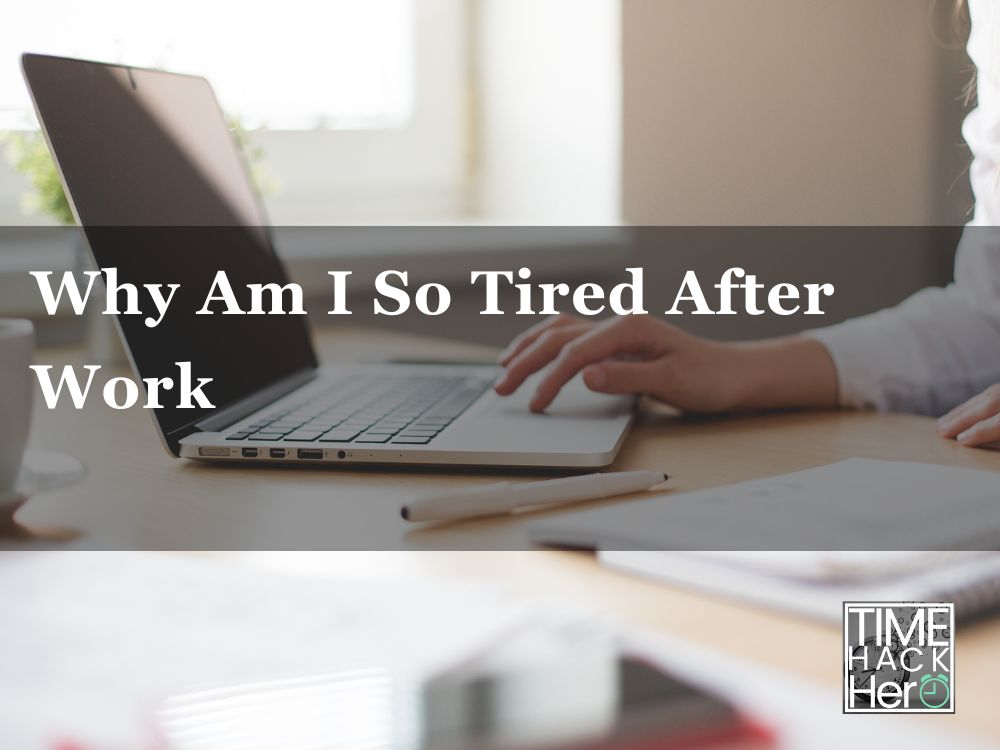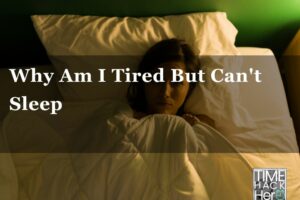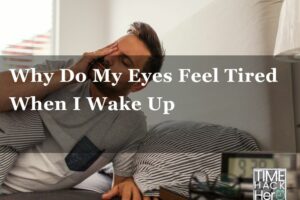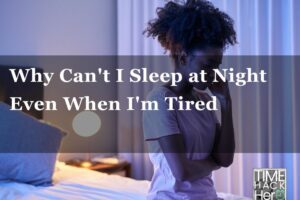It’s 3 p.m. Your eyes glaze over as you stare at your computer screen, the words and numbers blurring together. You stifle another yawn before glancing at the clock for the tenth time in the past hour. As soon as 5 o’clock hits, you’re out the door and headed home to collapse on your bed.
This scenario describes many hard-working professionals who feel completely spent at the end of each workday. While some degree of end-of-day tiredness is normal, excessive and unrelenting fatigue can seriously impact your health, work performance, and quality of life.
This comprehensive guide takes an in-depth look at why you may feel so wiped out after your shift. It explores the wide-ranging effects on your physical and mental health. Finally, you’ll find actionable solutions to help resolve persistent exhaustion so you can reclaim your evenings and live a more vibrant life.
Table of Contents
Is This Level of Fatigue Normal? Evaluating Post-Work Tiredness
Before delving into the reasons behind feeling drained, it’s important to identify what constitutes normal versus excessive tiredness after work:
Signs of Regular Fatigue
Experiencing the following symptoms infrequently is commonplace among workers:
- Mental fogginess late in the shift
- Quickly zoning out during meetings
- Heavy eyes and yawning in the afternoon
- Lower stamina and productivity as the day progresses
- Needing a catnap after getting home
These are signs your cognitive and physical reserves are tapped after a taxing workday requiring focus and effort. Occasional fatigue like this is perfectly normal.
Indicators of Abnormal Exhaustion
You may have a more serious issue if you regularly experience:
- Strong urge to nap daily at your desk
- Severe lack of motivation and mood changes
- Difficulty concentrating within an hour of starting work
- Repeated errors and careless mistakes due to fatigue
- Falling asleep immediately after dinner every night
Chronic symptoms like these signify an underlying health problem or lifestyle factors contributing to relentless tiredness. Left unaddressed, they can spiral into burnout and longer term complications.
While the occasional post-work yawn isn’t concerning, consistent and extreme fatigue is not normal. Next, let’s explore the wide range of potential reasons you feel so depleted.
Detailed Examination of Common Causes
Many different factors can cause excessive tiredness after your job. Understanding the root reasons is key so you can make the right changes to resolve daily exhaustion.
1. Inadequate Sleep
Not getting the 7 to 9 hours of quality sleep experts recommend for adults is arguably the most prevalent cause of persistent tiredness. Here’s why skimping on sleep leads to next-day exhaustion:
Sleep Debt Accumulates
When you repeatedly fail to get enough bedtime during the workweek, a sleep debt accumulates. Even if you catch up a bit on weekends, consistent sleep deprivation during your workweek creates an ongoing deficit. You simply cannot fully compensate for repeated minimal sleep through longer weekend snoozing.
Neurons Struggle to Recharge
During deep, restorative NREM sleep, your brain cells recover from the demands of the day. When deprived of enough sleep, these neurons cannot fully recharge. Your brain then struggles to focus and process information the next day, resulting in mental fatigue.
Blood Sugar and Hormones Disrupted
Lack of adequate sleep alters glucose metabolism and hormone levels. Imbalances in insulin, cortisol, ghrelin, and leptin due to lost sleep promote fatigue and cravings for quick energy in the form of carbs and sugar. This rollercoaster effect further tires out the body.
Immune Function Weakened
Without sufficient sleep, your T cells and infection-fighting antibodies are reduced. Chronic sleep loss stresses the immune system, making you more prone to sickness. Fighting an illness leaves you further depleted.
In summary, inadequate shuteye disrupts your body’s ability to refuel neurons, balance hormones, regulate blood sugar, and fight germs. The result is feeling drained instead of refreshed in the mornings and after work.
2. Demanding Work Conditions
The specific nature of your job can also lead to post-work exhaustion if it is:
Physically Demanding
Jobs requiring extended physical exertion like lifting, bending, prolonged standing, or repetitive motions tire out muscles and the cardiovascular system. Think nurses, construction workers, servers, landscapers, manufacturing, and warehousing. Pushing yourself physically for 8 or more hours leaves minimal reserves after work.
Mentally Exhausting
Professions requiring intense focus, decision making, problem solving, communications, math, writing, and analytical thinking sap mental stamina. Examples include engineers, programmers, attorneys, accountants, designers, and marketers. Brain drain leads to increased mental fatigue as the workday wears on.
Emotionally Draining
Jobs with nonstop interaction with clients, patients, students or the public can be socially and emotionally fatiguing. This is common among teachers, social workers, call center reps, psychiatrists, and other caregivers. Empathizing and caring for others all day is tiring.
Long Hours
Working excessive hours, including overtime and bringing work home, drains energy faster. Not allowing time to fully recharge between work shifts impedes recovery. Even energetic people get exhausted when work takes over their life.
In general, jobs demanding much physically, mentally or emotionally lead to greater depletion of resources. Allowing sufficient recovery time is essential to avoid burnout.
3. Excess Stress
Both acute and chronic stress commonly experienced at jobs can override the body’s energy-producing systems and leave you feeling zapped.
Stress Hormones Spike
When the fight-or-flight response is excessively triggered, adrenaline and cortisol flood the body. Relying on these hormones for long periods leads to endocrine imbalances that sap energy. High cortisol also promotes inflammation and suppresses the immune system.
Mental Alertness Fades
Stress and cortisol overexposure actually shrink the hippocampus region of the brain critical for memory and learning. This impairs your mental capabilities, leading to poor concentration, lack of focus and forgetfulness when stressed.
Immune Function Weakened
Chronic stress lowers your T-cells, NK cells and antibody immunoglobulin A levels. This makes you more susceptible to cold, flu and even chronic viral infections like Epstein Barr and cytomegalovirus which can trigger severe fatigue.
Neurons Overworked
Stress floods the brain with excess excitatory neurotransmitters like glutamate. This overstimulates your neurons, depleting their energy. Cortisol also limits glucose transport to underfuel brain cells. The result is mental exhaustion.
In short, ongoing exposure to highly stressful working conditions takes a major toll on your mental and physical reserves. Learning productive stress coping tactics is essential.
4. Poor Nutrition Habits
The typical American diet often leads to blood sugar spikes and crashes that exacerbate post-work fatigue.
Blood Sugar Rollercoaster
Diets high in simple carbs and sugar but low in fiber, protein and fat cause blood glucose levels to spike then crash. Reliance on quick fuel leads to energy peaks and valleys instead of steady energy all day long.
Low Micronutrients
Diets lacking sufficient B vitamins, iron, magnesium, omega-3s, antioxidants and other essential vitamins and minerals lead to cellular deficiencies. This starves your body’s engines of necessary nutrition for energy production and fighting fatigue.
Dehydration
Going all day without drinking enough water depletes fluids and electrolytes necessary for energizing biochemical reactions. Mild dehydration of just a 2% water loss causes headaches and weariness.
Caffeine Withdrawal
Over-relying on caffeine masks underlying fatigue and sets you up for exhaustion when levels drop. Cycle off caffeine products in the early afternoon to avoid withdrawal headaches and crashes common with coffee or energy drink habits.
Eating a solid breakfast, choosing complex carbs, staying hydrated, and avoiding excess caffeine and sugar crashes makes a big difference in dodging an energy plunge after work.
5. Sedentary Lifestyle
Physical inactivity promotes tiredness in several ways:
Poor Cardiovascular Fitness
Lack of regular exercise leads to a lower VO2 max, meaning your body can take in and use less oxygen. This reduces cardiopulmonary endurance needed to power you through the workday without hitting the wall.
Loss of Muscle Mass
Sitting for long periods results in loss of lean muscle mass, especially as we age. Having less metabolically active muscle lowers daily calorie burning needed for energy production and increases risk for weight gain and diabetes.
Impaired Blood Flow
Inactivity impairs endothelial function which controls proper vasodilation of arteries to deliver oxygenated blood to muscles and organs. When blood flow is compromised, every activity becomes a struggle.
Reduced Neurogenesis
Animal studies show physical activity boosts neurogenesis–the development of new neurons in the hippocampus which are important for focus, memory, learning and motivation. With a more sedentary lifestyle, you generate fewer energizing neurons.
Avoiding inactivity by taking movement breaks, standing or walking meetings, using stairs, parking further away, and exercising regularly counteracts these mechanisms promoting fatigue.
6. Medical Conditions
Various medical diagnoses can directly cause ongoing fatigue after work:
Anemia
Having insufficient healthy red blood cells reduces oxygen delivery to tissues and oxygen carrying capacity in the bloodstream. This manifests as constant tiredness and shortness of breath.
Diabetes
Uncontrolled blood sugar causes glucose to act as a neurotoxin, damaging neurons and blood vessels and resulting in depleted energy levels. Insulin resistance promotes inflammation which also slows the body while requiring it to work harder.
Thyroid Disorders
Both overactive (hyperthyroid) and underactive (hypothyroid) thyroids disrupt proper metabolism, body temperature regulation, heart rate, digestion, and brain function which slows the body.
Adrenal Insufficiency
When your adrenal glands cannot produce enough cortisol and aldosterone, it impairs your ability to handle physical and emotional stressors, often leading to chronic fatigue.
Chronic Fatigue Syndrome
This complex disorder of unknown origin causes severe persistent fatigue, headaches, memory issues and pain after exertion. Treatments aim to manage symptoms.
Depression
Major depression directly influences the central nervous system to create feelings of constant tiredness, lethargy, and lack of motivation along with its other impacts.
Seeking medical advice for unexplained, ongoing exhaustion can uncover if any diagnoses are influencing energy levels so proper treatment can improve fatigue.
7. Sleep Disorders
Conditions that impair sleep quality and quantity can leave you feeling anything but rested during the day:
Insomnia
Difficulty falling asleep and staying asleep deprive you of critical sleep time and the restorative benefits of deeper sleep stages needed to function optimally.
Sleep Apnea
Interrupted breathing while sleeping reduces oxygen levels creating frequent arousals so you never reach energy-restoring REM and deep sleep.
Restless Leg Syndrome
The irresistible urge to move your legs when lying down makes it challenging to fall asleep and causes night waking that sabotages sleep.
Circadian Rhythm Disorders
When your innate 24-hour sleep/wake cycle gets disrupted, you feel drowsy during waking hours but can’t sleep properly at night. This desynchronization exhausts the body.
Identifying and treating any sleep disorders is crucial for avoiding accumulated sleep debt that drains daytime energy.
The Far-Reaching Impacts of Feeling Exhausted After Work
Hopefully the wide range of potential reasons behind feeling wiped out after work paints a clearer picture of what may be at the root of your fatigue. But understanding the many adverse effects chronic exhaustion has on nearly every aspect of your life can provide further motivation to make changes.
Here is an overview of some of the top ways ongoing tiredness after your shift ends negatively impacts your health, happiness and performance:
Physical Health Decline
- Weakened immunity – More vulnerable to viruses, bacterial infections, and illnesses
- Weight gain – Too tired to exercise, crave more sugar for fast energy
- Heart problems – Excessive fatigue strains the cardiovascular system
- Diabetes risk – Exhaustion promotes insulin resistance and high blood sugar
- Muscle loss – Energy deficits and inactivity lead to loss of muscle mass
Mental Health Damage
- Depression – Fatigue contributes to or exacerbates clinical depression
- Mood changes – Irritability, anxiety, lack of motivation and positivity
- Reduced cognition – Struggle to concentrate, focus, remember details
- Altered brain structures – Shrinkage in regions vital for productivity
Work Performance Sabotage
- Presenteeism – Low output and subpar work despite being present
- Increased errors – Mental lapses lead to more mistakes and accidents
- Missed deadlines – Lack of focus causes delays in finishing projects
- Calling in sick – Taking excess sick days to catch up on rest
Daily Life Disruption
- Relationship conflict – Too tired to emotionally connect with loved ones
- Less leisure enjoyment – Exhaustion prevents enjoyment of hobbies
- Poor sleep habits – Ongoing fatigue causes insomnia
- Lower libido – Lack of energy reduces sex drive
- Bad habits – Relying on sugar, caffeine and behaviors for quick energy
Chronic fatigue clearly creates a destructive ripple effect across all aspects of health, productivity, and general well-being. Let’s move on to proven ways to resolve exhaustion.
Comprehensive Strategies to Regain Normal Energy Levels
The ideal solutions will be tailored to your specific suspected reasons behind feeling drained. But these tactics can help restore your reserves so you arrive home from work energized instead of exhausted:
Prioritize High-Quality Sleep
Make getting 7 to 9 hours of quality sleep every night your top priority. Follow proper sleep hygiene rituals like limiting screen time before bed, eliminating caffeine after 2 p.m., keeping your bedroom cool and dark, reading before bed, and going to bed and waking up at consistent times.
Adopt an Anti-Inflammatory Diet
Eat a diet focused on produce, plant proteins, healthy fats and whole grains to stabilize blood sugar and provide a steady stream of micronutrients. Limit processed foods and added sugars that cause energy crashes. Stay hydrated with water and herbal tea. Take anti-inflammatory supplements like turmeric, omega-3s and magnesium to ease inflammation-induced fatigue.
Exercise More Each Week
Aim for 150 minutes a week of moderate intensity activity like brisk walking or gentle cycling. This boosts energy by enhancing cardiopulmonary function, prompting neurogenesis, reducing inflammation and balancing hormones. Any movement helps – take frequent short breaks during your workday.
Define and Manage Stressors
Identify your job and life stressors that rob you of energy. Then adopt proven stress management strategies like delegating responsibilities, setting boundaries, saying no to extra duties, taking relaxing mini-breaks, deep breathing, meditating, and compartmentalizing work and home life.
Rule Out Any Medical Issues
See your doctor and describe your fatigue symptoms. Ask for blood tests to check for potential issues like anemia, low vitamin D and B12, hypothyroidism, Lyme disease, lupus, diabetes, or chronic fatigue syndrome. Diagnosing and properly treating any underlying condition causing exhaustion is crucial.
Optimize Your workspace
Make sure your workstation facilitates alertness with proper lighting, ability to get up and move around, supportive chair, and minimal noise. Take regular breaks to rest eyes from computer glare and recover mental focus. Shut down at a reasonable hour and set limits on taking work home.
Talk to Your Boss
Communicate any extremely draining aspects of your job duties or scheduling and discuss ways to create better work-life balance. Renegotiate responsibilities if your workload is unsustainable. Ask about support programs or services to help manage stress.
With some determination to get to the root of your fatigue and address it through lifestyle, diet, boundaries, medical care and work modifications – you can leave exhaustion behind. Don’t ignore debilitating tiredness and resign yourself to a life devoid of energy.
Frequently Asked Questions About Post-Work Fatigue
1. How can I tell if my fatigue is normal or more serious?
Occasionally feeling mentally foggy or wanting to curl up on the couch at the end of a grueling workday is normal. But if you experience physical achiness, mood changes, motivation loss, concentration issues or constantly need long naps, your fatigue likely indicates an underlying medical, dietary, or lifestyle issue needing attention.
2. What medical conditions can cause excessive tiredness after work?
Common medical reasons behind persistent exhaustion include anemia, diabetes, thyroid disorders, adrenal fatigue, chronic fatigue syndrome, fibromyalgia, Lyme disease, lupus, rheumatoid arthritis, depression, anxiety, sleep apnea, restless leg syndrome, and insomnia. Seeing your doctor can identify if a condition is behind your fatigue.
3. I get enough sleep yet still feel exhausted after work – why?
Even if you log 7-9 sleepy hours a night, poor sleep quality prevents you from entering restorative deep and REM sleep stages needed to re-energize. Potential sleep disruptors include sleep apnea, nighttime leg cramps, certain medications, caffeine intake, alcohol, uncomfortably warm bedrooms, stress and blue light exposure before bed.
4. How long before fatigue after work becomes dangerous?
While occasional tiredness after work is not concerning, if exhaustion persists daily for multiple weeks or months, it can start impacting your physical health, mental health, productivity, immune function, relationships, and safety. Make an appointment with your doctor to discover the cause before chronic fatigue takes hold.
5. What should I eat and drink for more energy after work?
Focus on complex carbs like whole grains, starchy veggies and fruits; lean proteins like fish, eggs, beans and poultry; healthy fats like nuts, seeds and olive oil; and staying hydrated









